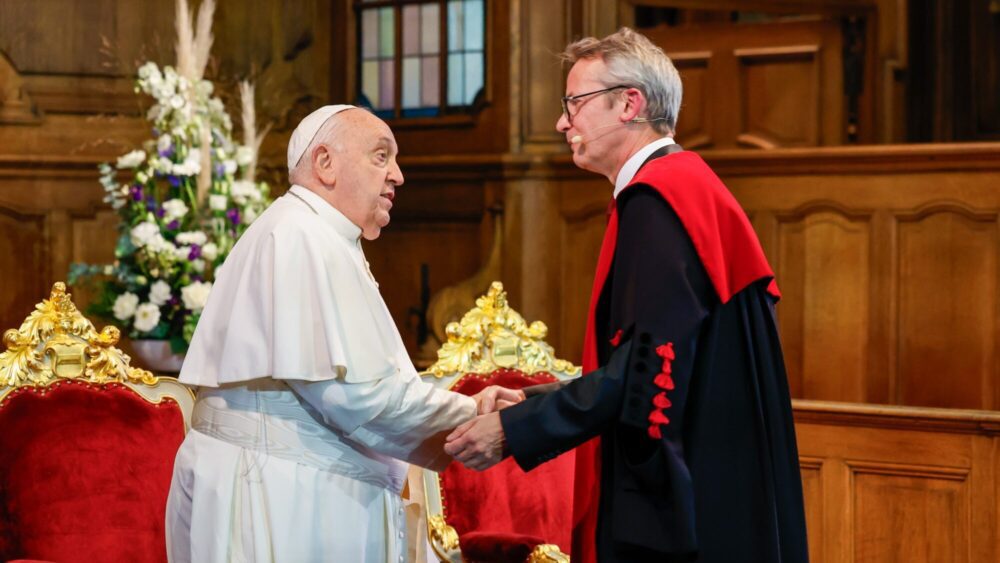
KU Leuven/Geert Vanden Wijngaert
During his visit to Belgium, where a large part of the Catholic community defends progressive positions, Pope Francis came up against a wall of hostility to his statements on abortion and on the role of women—especially from institutions that officially display the ‘Catholic’ label, such as the University of Leuven.
On a trip to Belgium, the pontiff visited the Katholieke Universiteit Leuven—the Catholic University of Leuven—which is celebrating its 600th anniversary this year.
The students had prepared a long letter for the pope in the form of a narrative alternating words and music, criticising his encyclical Laudato Si’ on integral ecology. Pope Francis‘ emblematic text was accused by the students of making women invisible, and of maintaining “an unfair division of labour in the name of a supposedly ‘natural’ propensity that leads to a sexual division of labour.” The students’ challenge continued with this provocative question: “What place, then, for women in the Church?” In their indictment, the young people on the rostrum demanded that the Church and the pope “change paradigm,” moving towards “integral development” that would take into account “inequalities of class, gender and race.”
Pope Francis’ response to this exhortation was not what was expected.
The pontiff fully assumed the traditional discourse of the Catholic Church on the place of women. He began by reminding us that the Church was “the people of God”, not a “multinational corporation.” He recalled that the Church was “mother,” before adding: “The woman, in the people of God, is daughter, sister, mother. Just as I am a son, brother and father.” His condemnation of the student comments was unambiguous:
What characterises a woman, what is feminine, is not determined by consensus or ideologies. And dignity is guaranteed by an original law, not written on paper, but in the flesh. Dignity is a priceless good, an original quality that no human law can give or take away.
He urged his listeners not to allow themselves to be trapped in an opposition of man against woman or vice versa: “that would be feminism or masculinism, whereas man is for woman and woman for man.” The pope’s final argument was spiritual: “Let’s remember that women are at the heart of the salvific event. It is through Mary’s ‘yes’ that God himself comes into the world. Woman is fruitful acceptance, care, and vital devotion.”
He ended his address by inviting the members of the University of Leuven to always seek the truth in order to be fully Catholic, with this lapidary advice: “Don’t get involved in ideological struggles and dichotomies.”
Following the papal visit, the Catholic university published a press release in which its rector, Françoise Smets, expressed her “major divergence” with the pope “with regard to the place of women in society:”
The Catholic University of Louvain [Leuven] expresses its incomprehension and disapproval of the position expressed by Pope Francis regarding the place of women in the Church and in society. It is a deterministic and simplistic position, and one with which our university can only disagree.
A student present on stage at the time of the exchange with Pope Francis expressed her disappointment, according to an account published by the Catholic French blog Le Salon Beige:
We’re extremely disappointed. We talked a lot in our message about the place of women, but the pope didn’t respond. We’re extremely shocked by what he said about the role of women in society. He talks about a fertile, conjugal role and motherhood, which is exactly what we want to emancipate ourselves from. The pope is still an extremely important figure in the world, and we hoped that he would be able to move the discourse forward, but that wasn’t the case.
The author of the story points out that the university’s official press release had clearly been prepared in advance, given how quickly it was published—as soon as the pope’s speech was over.
The pope’s visit to Belgium ended with a promise to open a process for the beatification of King Baudouin, known for his courageous stance in defence of life when, in 1990, he chose to abdicate temporarily to show his opposition to the legalisation of abortion in Belgium. The pope made this commitment on Sunday, September 29th, in front of 37,500 faithful, as he presided over a mass in the King Baudouin stadium in Brussels.
The day before, Pope Francis had paid his respects at the tomb of King Baudouin in the presence of King Philippe and Queen Mathilde. He praised Baudouin’s courage when he chose to “leave his post as king in order not to sign a homicidal law.” During his visit, Pope Francis urged “the Belgians to turn to him at this time when criminal laws are being drawn up,” referring to the laws in favour of abortion and euthanasia, which are particularly permissive in Belgium.
Pope Francis’ remarks sparked anger from the Belgian association Centre for Secular Action (Centre d’Action Laïque), which denounced them as a “provocation, on the very day of the international day for the right to abortion.”
On the plane back to Rome, the pontiff further alienated progressive Catholics by reiterating his firm condemnation of abortion, likening it to “homicide” and the doctors who perform it to “hired killers.”
